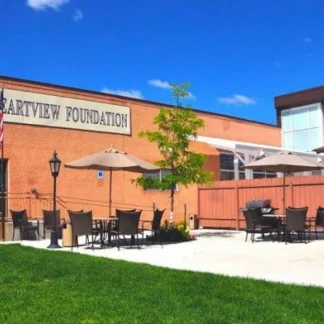Sanford Medical Center - Inpatient
Sanford Medical Center – Inpatient is a private rehab located in Bismarck, North...
Heartview Foundation is located in the historic district of downtown Bismarck, North Dakota. Heartview Foundation offers all services in one location. Their facility contains a 12-bed residential unit with an outdoor serenity park, group rooms, meeting rooms, individual offices, a health information management department and a business office.
Contact us for more information: (701) 222-0386

Connect with Heartview by calling their admissions team directly.
(701) 222-0386 Website Get DirectionsThe Joint Commission, formerly known as JCAHO, is a nonprofit organization that accredits rehab organizations and programs. Founded in 1951, the Joint Commision's mission is to improve the quality of patient care and demonstrating the quality of patient care.
Joint Commission Accreditation: Yes
Creativity is inherently healing, and can help those in recovery express thoughts or feelings they might not otherwise be able to. Creative arts therapy can include music, poetry/writing, painting, sculpting, dance, theater, sandplay, and more. Unlike traditional art, the final product matters far less than the experience of creation and expression itself.
Family programming is an essential part of all treatment categories at Heartview. They understand that addiction profoundly affects the family (or significant others), and healing must occur for both the patient and the family. Family members are often involved in the assessment process, helping them understand your alcohol or drug use and the problems it has caused. Once you are in treatment, they support and educate your family members as they deal with understanding your disease, treatment, and healing process. At the point you are ready, Your family members (or significant others) will come to Heartview and receive help in understanding addiction.
Group therapy is any therapeutic work that happens in a group (not one-on-one). There are a number of different group therapy modalities, including support groups, experiential therapy, psycho-education, and more. Group therapy involves treatment as well as processing interaction between group members.
In individual therapy, a patient meets one-on-one with a trained psychologist or counselor. Therapy is a pivotal part of effective substance abuse treatment, as it often covers root causes of addiction, including challenges faced by the patient in their social, family, and work/school life.
Nutrition therapy, aka medical nutrition therapy (MNT), is a way of treating physical, emotional, and medical conditions through diet. Specific dietary plans are designed by professional nutritionists or registered dietitians, and patients follow them in order to positively affect their physical and mental health.
Family programming is an essential part of all treatment categories at Heartview. They understand that addiction profoundly affects the family (or significant others), and healing must occur for both the patient and the family. Family members are often involved in the assessment process, helping them understand your alcohol or drug use and the problems it has caused. Once you are in treatment, they support and educate your family members as they deal with understanding your disease, treatment, and healing process. At the point you are ready, Your family members (or significant others) will come to Heartview and receive help in understanding addiction.
Group therapy is any therapeutic work that happens in a group (not one-on-one). There are a number of different group therapy modalities, including support groups, experiential therapy, psycho-education, and more. Group therapy involves treatment as well as processing interaction between group members.
In individual therapy, a patient meets one-on-one with a trained psychologist or counselor. Therapy is a pivotal part of effective substance abuse treatment, as it often covers root causes of addiction, including challenges faced by the patient in their social, family, and work/school life.
Nutrition therapy, aka medical nutrition therapy (MNT), is a way of treating physical, emotional, and medical conditions through diet. Specific dietary plans are designed by professional nutritionists or registered dietitians, and patients follow them in order to positively affect their physical and mental health.
Group therapy is any therapeutic work that happens in a group (not one-on-one). There are a number of different group therapy modalities, including support groups, experiential therapy, psycho-education, and more. Group therapy involves treatment as well as processing interaction between group members.
In individual therapy, a patient meets one-on-one with a trained psychologist or counselor. Therapy is a pivotal part of effective substance abuse treatment, as it often covers root causes of addiction, including challenges faced by the patient in their social, family, and work/school life.
Nutrition therapy, aka medical nutrition therapy (MNT), is a way of treating physical, emotional, and medical conditions through diet. Specific dietary plans are designed by professional nutritionists or registered dietitians, and patients follow them in order to positively affect their physical and mental health.
In individual therapy, a patient meets one-on-one with a trained psychologist or counselor. Therapy is a pivotal part of effective substance abuse treatment, as it often covers root causes of addiction, including challenges faced by the patient in their social, family, and work/school life.
Nutrition therapy, aka medical nutrition therapy (MNT), is a way of treating physical, emotional, and medical conditions through diet. Specific dietary plans are designed by professional nutritionists or registered dietitians, and patients follow them in order to positively affect their physical and mental health.
Nutrition therapy, aka medical nutrition therapy (MNT), is a way of treating physical, emotional, and medical conditions through diet. Specific dietary plans are designed by professional nutritionists or registered dietitians, and patients follow them in order to positively affect their physical and mental health.
Sanford Medical Center – Inpatient is a private rehab located in Bismarck, North...
Pride Manchester House is a private rehab located in Bismarck, North Dakota. Pri...
Saint Alexius Medical – Partial Hospitalization Program is a private rehab locat...
ADAPT is located in Bismarck, North Dakota. ADAPT is a Behavioral Health Agency ...